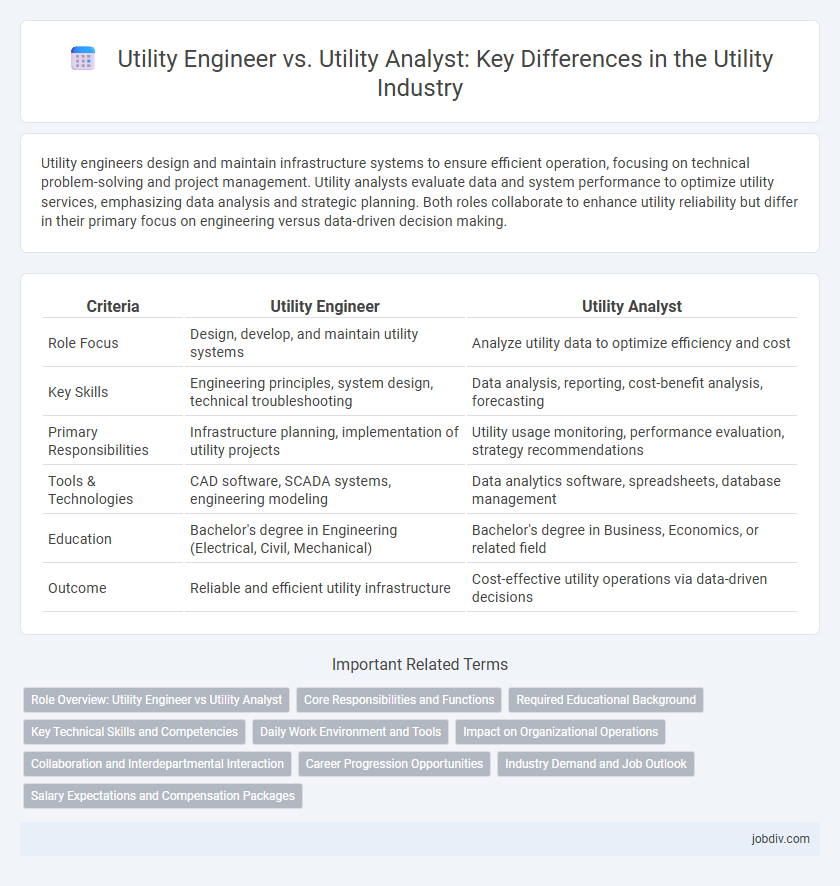Utility engineers design and maintain infrastructure systems to ensure efficient operation, focusing on technical problem-solving and project management. Utility analysts evaluate data and system performance to optimize utility services, emphasizing data analysis and strategic planning. Both roles collaborate to enhance utility reliability but differ in their primary focus on engineering versus data-driven decision making.
Table of Comparison
| Criteria | Utility Engineer | Utility Analyst |
|---|---|---|
| Role Focus | Design, develop, and maintain utility systems | Analyze utility data to optimize efficiency and cost |
| Key Skills | Engineering principles, system design, technical troubleshooting | Data analysis, reporting, cost-benefit analysis, forecasting |
| Primary Responsibilities | Infrastructure planning, implementation of utility projects | Utility usage monitoring, performance evaluation, strategy recommendations |
| Tools & Technologies | CAD software, SCADA systems, engineering modeling | Data analytics software, spreadsheets, database management |
| Education | Bachelor's degree in Engineering (Electrical, Civil, Mechanical) | Bachelor's degree in Business, Economics, or related field |
| Outcome | Reliable and efficient utility infrastructure | Cost-effective utility operations via data-driven decisions |
Role Overview: Utility Engineer vs Utility Analyst
Utility Engineers focus on designing, maintaining, and optimizing utility systems such as water, gas, and electricity distribution to ensure efficient and reliable service delivery. Utility Analysts specialize in analyzing utility data, monitoring consumption patterns, and providing insights to improve operational efficiency and cost management within utility companies. The roles diverge with engineers emphasizing technical infrastructure and system performance, while analysts concentrate on data-driven decision-making and strategic planning.
Core Responsibilities and Functions
Utility Engineers design, maintain, and optimize utility systems such as water, gas, and electricity to ensure efficient and reliable service delivery. Utility Analysts focus on data collection, performance analysis, and reporting to support operational improvements and cost management within utility services. Both roles play critical parts in enhancing system functionality and strategic planning for utility companies.
Required Educational Background
Utility engineers typically require a bachelor's degree in engineering disciplines such as electrical, mechanical, or civil engineering to acquire the technical skills needed for designing, maintaining, and optimizing utility systems. Utility analysts often hold degrees in fields like economics, business administration, or data analytics to effectively interpret utility data, forecast demand, and support strategic decision-making. Both roles benefit from specialized certifications and training related to utility management and industry regulations to enhance their expertise.
Key Technical Skills and Competencies
Utility Engineers excel in designing, maintaining, and optimizing utility systems such as electrical grids, water supply, and HVAC infrastructure, showcasing expertise in CAD software, SCADA systems, and regulatory compliance protocols. Utility Analysts specialize in data analysis, forecasting, and resource allocation using advanced statistical tools, energy management software, and cost-benefit analysis methods to improve operational efficiency. Both roles require strong problem-solving abilities, knowledge of industry standards, and proficiency in utility-specific technology, but engineers focus more on technical systems design while analysts emphasize data-driven decision-making.
Daily Work Environment and Tools
Utility Engineers primarily engage in designing, maintaining, and troubleshooting utility systems such as electrical grids, water supply, and gas pipelines using technical software like AutoCAD and SCADA. Utility Analysts focus on data analysis, performance monitoring, and cost optimization, employing tools such as Excel, SQL, and specialized utility analytics platforms to interpret operational data. Both roles collaborate to ensure efficient utility management but differ in hands-on engineering tasks versus data-driven decision support.
Impact on Organizational Operations
Utility engineers design and maintain infrastructure systems ensuring efficient energy and resource distribution that minimizes downtime and operational costs. Utility analysts interpret data on utility usage and performance, identifying trends and recommending strategies to optimize consumption and reduce waste. Together, their roles enhance organizational operations by improving reliability, reducing costs, and supporting sustainable utility management.
Collaboration and Interdepartmental Interaction
Utility Engineers focus on designing, maintaining, and optimizing utility systems, requiring close collaboration with technical teams such as operations, maintenance, and engineering departments to ensure system reliability and efficiency. Utility Analysts concentrate on data analysis and performance metrics, working interdepartmentally with finance, regulatory compliance, and management teams to assess cost-effectiveness and guide strategic planning. Both roles demand effective cross-functional communication to align technical execution with organizational goals and regulatory requirements in utility management.
Career Progression Opportunities
Utility Engineers often advance by specializing in technical design, project management, or systems optimization within utility infrastructure, positioning themselves for senior engineering or managerial roles. Utility Analysts typically progress through roles emphasizing data analysis, regulatory compliance, and operational efficiency, leading to opportunities in strategic planning or utility management. Both career paths offer growth prospects in utility companies, but engineers generally move toward technical leadership, while analysts gravitate toward business and regulatory strategy roles.
Industry Demand and Job Outlook
Utility Engineers are in high demand for designing, maintaining, and optimizing infrastructure systems in energy, water, and waste sectors, driven by increasing investments in sustainable utilities and smart grid technologies. Utility Analysts focus on data-driven decision-making and operational efficiency, leveraging analytics to improve resource management and cost control, which aligns with the growing emphasis on sustainability and regulatory compliance in the utility industry. Job outlook for both roles remains strong, with projected growth fueled by infrastructure modernization and the transition to renewable energy sources.
Salary Expectations and Compensation Packages
Utility Engineers typically command higher salary expectations than Utility Analysts due to their specialized technical skills and engineering background, with average annual salaries ranging from $75,000 to $110,000. Utility Analysts earn between $60,000 and $85,000, reflecting their focus on data analysis and operational efficiency rather than engineering design. Compensation packages for Utility Engineers often include performance bonuses, technical certifications, and professional development opportunities, while Utility Analysts may receive incentives tied to cost-saving initiatives and process improvements.
Utility Engineer vs Utility Analyst Infographic

 jobdiv.com
jobdiv.com